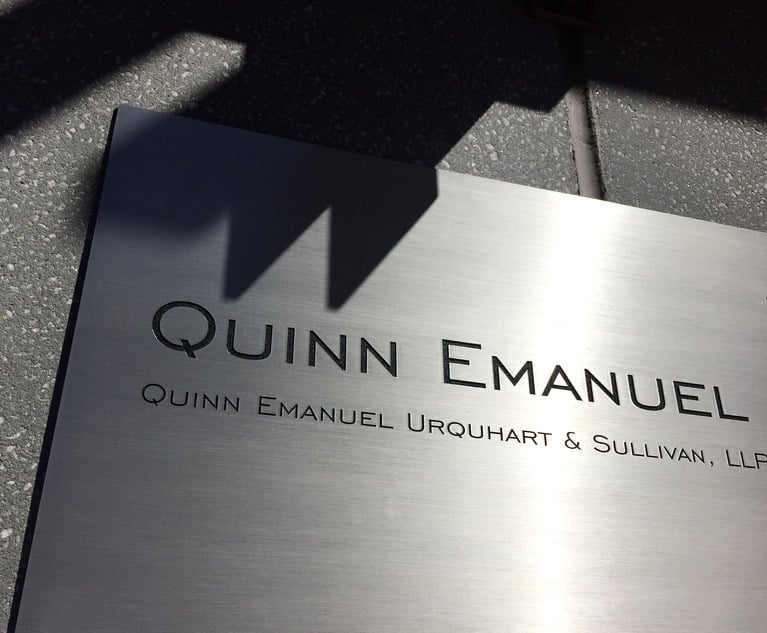Government cyber unit stresses legal sector threats and urges firms to protect themselves
Lawyers acknowledge scale of cyber security threat amid growing need for preventative measures
July 24, 2018 at 04:26 AM
4 minute read
The Government's National Cyber Security Centre (NCSC) has called on law firms to take action to protect themselves from cyberattacks, amid concerns that many do not have adequate systems in place to ward off threats to their IT infrastructure.
The NCSC, which was launched last February, has released a 'legal sector threat report' designed to "encourage industrywide adoption of cybersecurity best practice", citing the growing financial and reputational impact of attacks on law firm systems.
The report states that between April 2016 to March 2017, the Solicitors Regulation Authority received reports of cyberattacks resulting in total losses of £11m in client money, while PwC's 2017 law firm survey found that more than 60% of all law firms reported suffering some form of security incident during the previous year.
Perhaps the loudest warning shot came in June last year, when DLA Piper suffered a ransomware attack that shook the firm's IT infrastructure, triggering lengthy global disruption.
Many senior lawyers acknowledge that firms are not doing enough to protect themselves from threats such as data breaches, phishing and malware.
 Mark Shillito (pictured), global head of intellectual property at Herbert Smith Freehills (HSF), says cybercrime is "one of the risks that's on every board's mind – and if it isn't, it should be".
Mark Shillito (pictured), global head of intellectual property at Herbert Smith Freehills (HSF), says cybercrime is "one of the risks that's on every board's mind – and if it isn't, it should be".
"Everyone needs to think about it," he says, "especially law firms, because of the role they play in the commercial value chain – it's right that the government is getting behind that."
According to Shillito, HSF is making efforts to ensure its staff are alert to such threats. "We've adopted hacker-type tactics to help train our staff; setting up scenarios and sending fake phishing emails – you've got to keep people on top of that," he says. "You can't relax, because it's neverending.
"You've got nation-state attackers, but also ordinary decent criminals, so you've really got to get serious about this stuff. We also have an information security group, which ensures that we are protecting our own and our client's information, and doing everything we can to minimise risk."
Bird & Bird commercial partner Simon Shooter, who regularly speaks on the topic of cybersecurity, says he is surprised to see how few businesses are protecting themselves against increasingly sophisticated threats.
"We're seeing 100% acceptance that cyber risk is a major business risk. Most would put it in their top five [business concerns]. But how many have a response plan? You'll see only 40%-50% of hands in the air.
"Professional services firms have been identified for a long time as a target because of the valuable data and valuable information [they hold], and law firms are as critically exposed as anyone due to things like trade secrets and the sensitive client information they hold.
"The government is saying that businesses need to do a lot more than they're doing, and need to look after themselves."
The NCSC report also highlights a number of industry trends that have made the legal sector particularly vulnerable to cyberattacks, including the rise of automation, the disaggregation of legal services, as well as the use of a widening range of technologies.
Linklaters counsel Peter Church, whose practice focuses on data privacy and e-commerce regulation, says the NCSC's report is a "timely reminder to law firms of ongoing cyber risks", which "highlights the need to ensure they have in place proper processes to protect client data and funds".
Church points in particular to the rise of cloud computing within law firms as posing a "particularly interesting challenge". The cloud offers many benefits for law firms and Church believes that, while it "opens up risks, it also offers more security, particularly for smaller firms which do not have the funds or the resources to arm themselves".
This content has been archived. It is available through our partners, LexisNexis® and Bloomberg Law.
To view this content, please continue to their sites.
Not a Lexis Subscriber?
Subscribe Now
Not a Bloomberg Law Subscriber?
Subscribe Now
NOT FOR REPRINT
© 2025 ALM Global, LLC, All Rights Reserved. Request academic re-use from www.copyright.com. All other uses, submit a request to [email protected]. For more information visit Asset & Logo Licensing.
You Might Like
View All
X Ordered to Release Data by German Court Amid Election Interference Concerns

Compliance With the EU's AI Act Lags Behind as First Provisions Take Effect

Quinn Emanuel's Hamburg Managing Partner and Four-Lawyer Team Jump to Willkie Farr

Trump ICC Sanctions Condemned as ‘Brazen Attack’ on International Law
Trending Stories
- 1ACC CLO Survey Waves Warning Flags for Boards
- 2States Accuse Trump of Thwarting Court's Funding Restoration Order
- 3Microsoft Becomes Latest Tech Company to Face Claims of Stealing Marketing Commissions From Influencers
- 4Coral Gables Attorney Busted for Stalking Lawyer
- 5Trump's DOJ Delays Releasing Jan. 6 FBI Agents List Under Consent Order
Who Got The Work
J. Brugh Lower of Gibbons has entered an appearance for industrial equipment supplier Devco Corporation in a pending trademark infringement lawsuit. The suit, accusing the defendant of selling knock-off Graco products, was filed Dec. 18 in New Jersey District Court by Rivkin Radler on behalf of Graco Inc. and Graco Minnesota. The case, assigned to U.S. District Judge Zahid N. Quraishi, is 3:24-cv-11294, Graco Inc. et al v. Devco Corporation.
Who Got The Work
Rebecca Maller-Stein and Kent A. Yalowitz of Arnold & Porter Kaye Scholer have entered their appearances for Hanaco Venture Capital and its executives, Lior Prosor and David Frankel, in a pending securities lawsuit. The action, filed on Dec. 24 in New York Southern District Court by Zell, Aron & Co. on behalf of Goldeneye Advisors, accuses the defendants of negligently and fraudulently managing the plaintiff's $1 million investment. The case, assigned to U.S. District Judge Vernon S. Broderick, is 1:24-cv-09918, Goldeneye Advisors, LLC v. Hanaco Venture Capital, Ltd. et al.
Who Got The Work
Attorneys from A&O Shearman has stepped in as defense counsel for Toronto-Dominion Bank and other defendants in a pending securities class action. The suit, filed Dec. 11 in New York Southern District Court by Bleichmar Fonti & Auld, accuses the defendants of concealing the bank's 'pervasive' deficiencies in regards to its compliance with the Bank Secrecy Act and the quality of its anti-money laundering controls. The case, assigned to U.S. District Judge Arun Subramanian, is 1:24-cv-09445, Gonzalez v. The Toronto-Dominion Bank et al.
Who Got The Work
Crown Castle International, a Pennsylvania company providing shared communications infrastructure, has turned to Luke D. Wolf of Gordon Rees Scully Mansukhani to fend off a pending breach-of-contract lawsuit. The court action, filed Nov. 25 in Michigan Eastern District Court by Hooper Hathaway PC on behalf of The Town Residences LLC, accuses Crown Castle of failing to transfer approximately $30,000 in utility payments from T-Mobile in breach of a roof-top lease and assignment agreement. The case, assigned to U.S. District Judge Susan K. Declercq, is 2:24-cv-13131, The Town Residences LLC v. T-Mobile US, Inc. et al.
Who Got The Work
Wilfred P. Coronato and Daniel M. Schwartz of McCarter & English have stepped in as defense counsel to Electrolux Home Products Inc. in a pending product liability lawsuit. The court action, filed Nov. 26 in New York Eastern District Court by Poulos Lopiccolo PC and Nagel Rice LLP on behalf of David Stern, alleges that the defendant's refrigerators’ drawers and shelving repeatedly break and fall apart within months after purchase. The case, assigned to U.S. District Judge Joan M. Azrack, is 2:24-cv-08204, Stern v. Electrolux Home Products, Inc.
Featured Firms
Law Offices of Gary Martin Hays & Associates, P.C.
(470) 294-1674
Law Offices of Mark E. Salomone
(857) 444-6468
Smith & Hassler
(713) 739-1250









